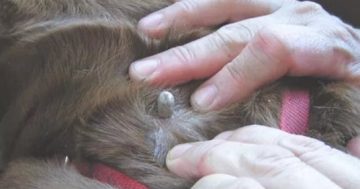
Pet owners in the Riverina are being reminded about the potential harm that rat baits can cause to their animals due to a higher than normal rodent population in the colder months. Photo: Wagga Wagga Veterinary Hospital.
With the days getting cooler and the afternoons getting darker, the winter months also bring an increase in the number of sightings of rats and mice.
It’s during these upcoming cooler months that the Wagga Wagga Veterinary Hospital encourages pet owners to remain cautious and vigilant about their pets’ access to rat/mouse baits.
“Due to the colder outdoor temperatures, rodents look for warmer environments indoors and what comes with that is an increase in baits to limit potential infestations,” Wagga Wagga Veterinary Hospital’s Dr Becci Brabin said.
“Some people think as long as their pets don’t have direct access to the baits that they are safe but that is just not the case.
“Rats and mice who consume the baits can move smaller parts of bigger baits to other areas of the house, making it more accessible to pets.”
Most rodent baits, despite their toxicity, are believed to be very tasty for pets, specifically dogs.
Dogs in particular who ingest bait are vulnerable to severe symptoms such as lethargy and internal bleeding – commonly located around the chest – as well as anaemia.
“Vets are able to run tests in clinic to see if they can administer an antidote quickly after pets have eaten toxic baits,” Dr Brabin said.
“The importance of acting quickly can’t be understated, if owners aren’t able to recognise it quickly their pets may need a transfusion.”
Dr Brabin said that a few key indicators to quickly tell if a pet had ingested baits included the discolouration of their poo, the animal not being as active as usual, refusing to eat food and not being as engaged as usual.
“Often baits are either blue, green or red. If your pet has eaten one of the baits often their poo matches or closely resembles the colour of the bait that they have eaten.”
Pet owners are encouraged to remain cautious during the winter months by taking precautions such as placing baits in out of reach locations such as in roof cavities or cupboards/wardrobes, walking dogs on leads when outside the house and making sure that pets are continuing to eat their food.
Pet owners on farms or with large outdoor areas are also being reminded to look out for snail and slug baits. Snail/slug baits cause similar symptoms to rat baits including shaking, panting, excessive salivation, high body temperature, seizures, vomiting and diarrhoea.
If you believe your pet has ingested a toxic substance, please call your local vet as soon as possible for an antidote, or a transfusion in a serious case.








